| Hi Cookingrecipes, Greetings!
Do you know what MSG is? Well, many friends are sending me
emails asking about the different opinions about MSG. I feel
the need to talk a little about it.
MSG stands for Monosodium glutamate. It is a white crystalline compound used to enhance flavor. It has been around for centuries. However, the popularity of MSG in Chinese cooking has fallen in recent years. Many experts blame MSG for "Chinese Restaurant Syndrome"- the headaches, dizziness, and chest pains some people
experience after dining out at a Chinese restaurant.
There is a real debate among the scientific community over
whether MSG is the culprit. A 1995 report by the U.S. Food
and Drug Administration states that MSG is safe for the
general public. On the other hand, another 1995 report, this
time from the Federation of American Societies for Experimental Biology (FASEB), states that MSG may be a problem for certain individuals. Specifically, the report states that asthmatics and people who can't tolerate large amounts of MSG may be at risk.
But even if you don't experience negative side effects, is
there any need for you to use MSG when preparing Chinese dishes? Again, the experts disagree. Some cooks argue that a well cooked meal using fresh vegetables doesn't need enhancing. Others do use it occasionally.
However, I think it is OK to use MSG occasionally. SO WHENEVER I mention MSG in my recipes, I DO mean that you can use it OPTIONALLY.
Now, we come to today's recipes. Have fun! Beef with Red Onions
(Red onions add a distinctive flavor to this dish)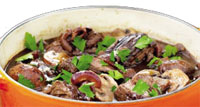
Serves 3 to 4 Ingredients: 1 pound beef (flank or top sirloin steak), cut julienne
2 red onions, chopped
1 clove garlic, crushed
1 piece ginger, sliced
2 green onions, sliced diagonally
Marinade:
1 egg white
2 tablespoons light soy sauce
1 tablespoon cooking wine
1 tablespoon cornstarch
A few drops of sesame oil
Sauce:
3 tablespoons dark soy sauce
1 tablespoon sugar
1 tablespoon sherry
1/4 cup water (if desired)
Oil for cooking * You can find popular Chinese cooking ingredients and cookware at ChineseFoodDIY online store at:
http://www.chinesefooddiy.com/shopping.htm
Directions:
Cut beef across the grain. Add the marinade ingredients,
and marinade beef for about 15 minutes.
While beef is marinating, prepare vegetables and sauce.
Heat wok and add 2 tablespoons oil, allowing it to drizzle
down the sides. When oil is ready, add ginger and garlic.
Stir-fry briefly and add onions. Stir-fry until onions are
tender but not overcooked. Remove and set aside.
Add oil to wok. Add the beef, stir-frying until it changes
color. If desired, add water at this point to make a gravy.
Return the vegetables to the wok and mix well. Add the
green onion. Serve hot with rice.
Nutritional Breakdown per serving (based on 4 servings):
377 calories (kcal); 23 g Total Fat (36 percent calories
from fat); 24 g Protein; 16 g Carbohydrate; 72 mg Cholesterol; 1152 mg Sodium; 2 g Fiber, 551 mg Potassium
Recipes in this newsletter are from Nicholas Zhou's bestselling cookbook "Real and Healthy Chinese Cooking". 
http://www.chinesefooddiy.com/cookbooks.htm
Deep-Fried Beef or Mutton Rolls
Ingredients: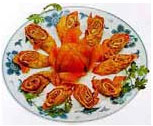
1 lb. (500g) lean boneless beer or mutton
3 tsp. flour
4 tsp. salt
3 dried bean-curd sheets
1/4 tsp. ground Sichuan peppercorns
2 cups (500ml) vegetable oil for deep-frying
1/2 tsp. scallions, chopped
1/4 tsp. spiced pepper-salt
1/2 tsp. fresh ginger, chopped
1/4 tsp. MSG (optional)
2 tsp. cornstarch (cornflour)
Directions:
1. For the filling, mince the meat and mix with the salt,
ground peppercorns, scallions, ginger, 1/4 tsp. of the
cornstarch, the MSG(optional) and enough water to bind the
ingredients together. Set aside.
2. Mix the other 1/4 tsp. of cornstarch with the flour and
enough water to make a thick paste.
3. Soak the bean-curd sheets in warm water until soft. Take
1 sheet and spread the paste on the upper surface. Spread
1/3 of the meat filling lengthwise down the centre, leaving
room at the bottom and on both sides. Fold up the bottom
flap and start rolling. Midway, fold the two side flaps
towards the centre. Continue rolling . Seal the open end
with a dab of flour paste. Repeat with the other two rolls.
4. Place the rolls on a heat-proof and place in a steamer.
Steam until the meat is cooked. Remove the rolls. Wrap each
tightly in a piece of clean cheesecloth. Let stand until
cool, then unwrap and cut crosswise into 1-inch or 30mm
long sections.
5. Heat the oil in a wok over medium heat to 400oF, or until
a piece of scallion green or ginger quickly turns brown when
tossed into the oil and a haze appears above the surface.
Add the rolls and deep-fry until radish-brown. Remove and
drain well. Sprinkle with the spiced pepper-salt and serve.
Imperial Rolls (Cha Gio)
(Made with papayas, this Somoan dish is an interesting
variation on stuffed green peppers) Serves 16 Ingredients: 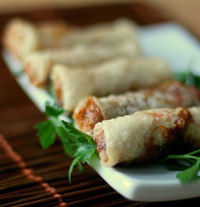
- 1 package rice paper wrappers (banh trang) round shaped
- 1 lb ground pork or chicken (lean pork is best)
- 1/2 cup onion, chopped
- 1/4 teaspoon ground black pepper
- 1/3 teaspoon salt
- 1 teaspoon sugar
- 1 carrot, shredded
- 1 egg
- 1 ounce bean thread noodles (soaked in hot water for 15 minutes to soften )
- 2 dried mushrooms (soaked in warm water for about 15 minutes)
- 1 tablespoon fish sauce
Oil for deep-frying
Directions:
Drain the mushrooms and noodles. Chop - the noodles
should be chopped into approximately 2-inch lengths.
Mix the filling ingredients together.
Dip the rice paper wrappers in warm water. (Alternately,
you can use a pastry brush dipped in water to dampen the
wrappers). Lay out on a flat counter or on a towel.
Spoon about two heaping tablespoons of filling onto the
bottom section of the wrapper. Roll the bottom edge over
the filling. Fold the two sides over the filling, and then
roll up. Repeat with the other wrappers.
Pour about 2 inches of oil into the wok. Deep-fry the wrappers a few at a time, carefully sliding them into the wok so the oil doesn't splatter. Deep-fry until light brown. Drain the rolls on a tempura rack if you have one, and then place on paper towels or a towel. To serve, cut the rolls crosswise
into serving size pieces, or serve wrapped in lettuce or
cilantro leaves. Serve with Nuoc mam dipping sauce (sweet
and sour fish sauce).
Scrambled Eggs with Tomatoes
Ingredients: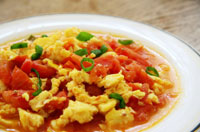
3 tomatoes
1/2 tsp. scallion, shredded
2 eggs
1/2 tsp. fresh ginger, shredded
1 tsp. salt, or to taste
1 1/2 tsp. sugar
4 tbsp vegetable oil
1/4 tsp. MSG (optional)
Directions:
1. Drop the tomatoes in boiling water for 30 seconds.
Remove, drain, and peel. Cut in half, squeeze out the seeds,
and chop coarsely.
2. Beat the eggs with the 1/4 tsp. salt.
3. Heat 2 tbsp of the oil in a wok over high heat until the
oil surface ripples . Pour in the eggs and cook, stirring
constantly, until thickened. Remove from the wok and place
in a dish. Add the other 2 tbsp of oil to the wok and reheat
until very hot. Add the scallions and ginger and stir-fry
for a few seconds. Then add the tomato, the remaining salt,
sugar and MSG (optional) . Stir-fry about 30 seconds, then
return the scrambled eggs to the wok . Stir to blend, remove,
and serve. Cooking Tips: Cooking Methods in Chinese Cooking: Flavor-Potting
Steaming 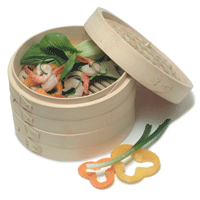
Chinese cooking uses two methods of steaming, or cooking foods over, rather than in, liquids.
Basic steaming (zheng)
In basic steaming (zheng), the ingredients are placed in
a heat-proof container with a seasoned sauce. Then the
container is placed in a steamer partially filled with
water and set over high heat. The food cooks quickly in
the vapor and is removed when barely done. The result is
fresh and tender.
Placing one tightly-closed pot inside a larger pot (steaming dun)
Another form of steaming involves placing one tightly-closed
pot inside a larger pot (steaming dun). In this method,
the ingredients, a seasoned sauce, and a large amount of
stock go into one pot, which must have a tight-fitting lid.
The pot is half-immersed in boiling water in another
larger pot and steams for two or three hours. The result is
very soft.
Flavor-Potting 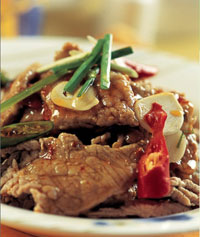
This method refers to stewing foods in a highly-flavored sauce. Basic flavor-potting (lu)
Basic flavor-potting (lu) means stewing the food in a mixture of soy sauce, rice wine, sugar, salt, red fermented rice mash, and five-spice powder, scallions, ginger, chicken stock and water. The food cooks over low heat for several hours and comes out tender and full of flavor.
Marinating and flavor-potting (jiang)
Marinating and flavor-potting (jiang) adds the step of
marinating the food in salt, soy sauce, and soybean paste
(also known as ground bean sauce) before it is stewed in the
flavor-potting sauce.
Cookingrecipes, if you have any question, please visit our FAQ page at:
http://www.chinesefooddiy.com/faq.htm
You can find the most common questions and answers there.
I am becoming very hungry now. Have to cook something to eat. I will try Stir-fried Pork Slivers with Ginger by myself! Enjoy your day!
All the best,
Happy cooking!

Nicholas Zhou - Author
Real and Healthy Chinese Cooking 
http://www.chinesefooddiy.com |